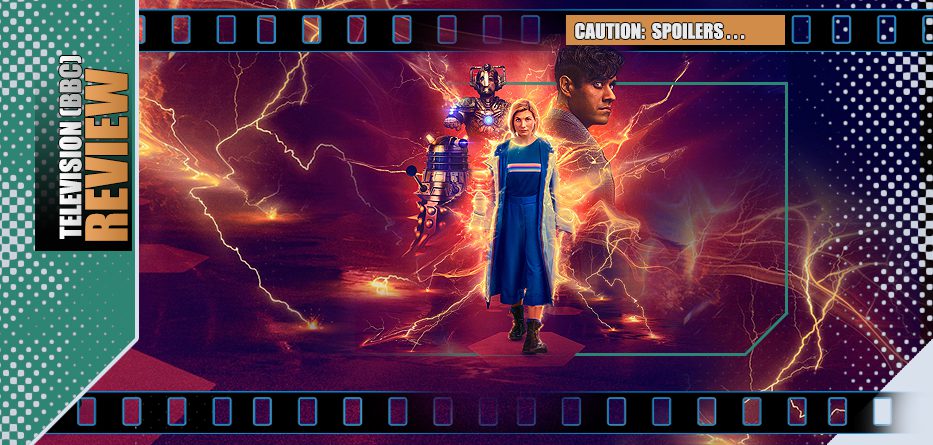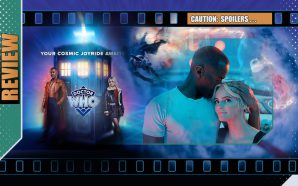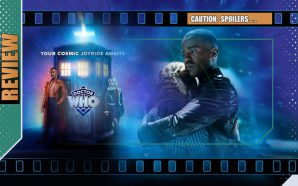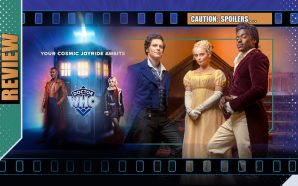Someone is defacing classic portraits through the centuries, someone has kidnapped the world’s beat seismologists, someone is influencing an early 20th Century Russian Tsar and someone has planned a train heist involving a powerful cosmic entity.
And, it seems, someone has created a plan to lure the Doctor into a final trap.
However, as her time grows short and a regeneration is forced upon her, it appears the Doctor has allies who aren’t going to let her go so easily…
*spoilers*
I’ll be perfectly honest… and let’s get this out of the way first… I haven’t particularly enjoyed this era of Doctor Who. I had no problem with the innate casting of a woman as the incumbent Doctor (a shape-shifting alien who has already gone through a whole range of age, height, weight and gait transformations… fine… I don’t think it was wrong nor essential) and the teaser ‘reveal’ video of Jodie Whittaker picking up the key and approaching the Tardis sent an initial tingle down the spine, a look of wonder on her face essential to anyone who portrays the Gallifreyan wanderer. Whittaker had – has – a track-record of diverse roles and seemed more than capable a choice for a new direction – provocative for some, maybe, but arguably each incarnation has been controversial in their own way.
But, for me, thereafter, things went fundamentally astray. The teased new logo sequence was fun and had a sense of red and yellow colours invoking mystery and style and there was much talk of a more optimistic Doctor with rainbow colours through much of the subsequent imagery. Yet when the new series arrived, so much seemed to fly in the face of that preamble. Yes, the show was on a new night with a new production team, new companions – all of which have played in to previous transitions. But in addition there was initially no sign of that Tardis (which arrived in the second episode with an internal look that looked like a cheap, unimaginative and unconvincing Top of the Pops set compared to previous versions). Then there was the new title sequence (which also didn’t arrive until the second episode) that was not those promised golden and crimson swirls, but quite the opposite: an inky, dark, incoherent swirl that looked more like a screen-saver. It all felt… well, askew, a bit cheap and thrown together with parts that didn’t seem to fit as a singular vision. Yet, ‘first’ seasons for a new Doctor are always incredibly subjective and often take time to settle in and it’s hard to judge what’s to come, for better or worse, from an opening salvo. Equally, I was becoming reluctantly aware that I probably wasn’t the target audience anymore. If that first season continued to feel like it was a hodge-podge of ideas, then fair enough… but whether by intent or course-correction, the following runs veered wildly between grand visions eschewing its history and then open nostalgia. Show-runner Chris Chibnall might not seemed to have had a definitive direction going forwards, but as time passed he clearly had his own ideas about the show in regards to its established history. Again, it’s possible to quibble and say these were mythological additions to a long-running show with a history of inevitably contradicting itself over the decades, but Chibnall’s sojourns weren’t mere tweaks, it was wholesale reinvention of some of its supporting structures, answering questions that perhaps didn’t need to be asked (or at least confirmed). Add to it all a swerve between a budget spent on huge VFX (but occasions when they didn’t even seem finished) a final season of stories (in the mini-series ‘Flux‘) that seemed both overtly complicated and completely loose-knit and then ended with the Doctor/show-runner appearing to shrug over the loss of 3/4 of the universe being wiped out because of her involvement and simply move on… and there are both people liking and plenty of people positively welcoming the end of the Chibnall/Whittaker era to different degrees.
Which is a shame, largely because while some of those criticisms seem completely valid, it’s also ignited a toxic streak that went far beyond disappointment and fair criticism and into an almost gleeful dancing and celebrational hope of continued failure and personal attacks. So going into this last special, just as the BBC kickstarts its centenary celebration, it seems there’s a sense of some overtly hoping it’s great and others overtly hoping it’s terrible and, thus, it’s somewhat doomed to walk a line that may please no-one.
So how powerful was The Power of the Doctor?
Well, the short review is that there were some beautiful moments along the way and some nice nods to the past, some unapologetic crowd-pleasing set-pieces and a reverential, nicely pitched last few minutes as a send-off for Jodie Whittaker. (For me, it was a better exit-monologue than Capaldi’s goodbye) However, the plot itself was beyond incomprehensible, a pick-n’mix of elements that made not a lick of sense, even on a second watching, a chaotic series of ideas thrown together with many of the joins still showing and very little of the connective tissue bearing any resemblance to logic or basic coherence over ninety minutes. Big, bavura, bonkers. Some would say it’s the perfect ‘last post’ for this era whichever side of the fence you’re on.
The longer version? That requires more nuance and caveats.
We quickly have a range of story threads involving a second planet appearing in the sky in 1916, with the Master taking the role of that meddling Mad Monk Rasputin, his chronologically altering classic pieces of art through the centuries, the Daleks getting ready to ignite most of Earth’s key volcanoes and the Cybermen involved in a cosmic train heist in which the ‘loot’ seems to be a young glowing girl. It’s quite impossible to explain how they all fit together, except that most of them involve the Master simply trying to attract the Doctor’s attention, so he can use the glowing girl as a power-source for a Tardis-channeling cyber-planet and hijack the Doctor’s body via a ‘forced’ regeneration. The Cybermen and Daleks, sworn enemies, are working together because….something.
Being not just a Doctor Who special but also part of the BBC‘s 100th, there were plenty of nods to the series’ past. Among the faces returning were the already announced Sophie Aldred as Ace, Janet Fielding as Tegan Jovanka and Jemma Redgrave as Kate Stewart as well as Bradley Walsh as Graham. But kept far from public view and only the subject of speculation, until the time was right, we also had Peter Davison, Sylvester McCoy, Colin Baker, David Bradley and Paul McGann as vestiges of the Doctor’s consciousness (and Jo Martin as the Fugitive Doctor… because) and, towards the end the splendid idea of a ‘Support Group’ made up of past companions (a nice cameo for Katy Manning as Joe Jones (nee Grant) and a wonderful nod for original companion William Russell as Ian Chesterton, at last). Bonnie Langford has a few lines there as Melanie Bush, but her inclusion seems rather abstract.
Whittaker doesn’t get to exercise any real extremes to her character here, there’s not really no compelling, memorable righteous anger or pure ‘hero’ moment until her last speech, but she does well enough within the framework of the established incarnation. She frowns, beams and dashes around as usual and you believe in a character that wants to experience fun and wonder but that the universe seems to yank one way then the other. Halfway through she’s forced to regenerate, with the Master taking control of her body. A full-on body-swap between the adversaries has always been an interesting idea that’s never been executed before (ironic in a show that is renowned for swapping out the bodies of its hero) but that’s not really what happens here, despite the plot trying to convince you otherwise. It’s just Sasha Dawan dancing around in Whittaker’s pant-suit and continuing to be… well, the Master. But it does remove Whittaker’s version from the physical fray and so Whittaker goes to visit a spiritual roadside stop in which past incarnations stop her going any further and then the story gives us an ‘Emergency Medical Hologram’ version of the Doctor that she has previously instigated to offer advice to anyone left behind after she’s gone. It’s not the first time we’ve seen such – Eccleston’s Doctor had a version as far back as the end of the first Nu-Who season… however, this version seems far too interactive – basically a translucent version of the real thing – merely because the story needs her to be a presence even when she’s not.
But one thing that story-telling device does do – and does very well indeed – is offer some key moments to the supporting players. Aldred’s Ace and Fielding’s get some face-to-face moments with the visage of Sylvester McCoy and Peter Davison respectively, both sets of relationships partly defined by their less-than-perfect separations in the original 80s run. We know Tegan left after the strain of seeing the dangers of the universe – specially Daleks – proved too much (in Resurrection of the Daleks) and Ace’s eventual departure was off-screen after the last original serial (Survival – which gets a nice feline reference in this special). Moments like this really support the idea of the longevity of the show. One thing the ‘hologram’ idea seems askew for is the inclusion of Jo Martin’s Doctor which would seem impossible for Whittaker’s incarnation to have installed, but it’s another crowd-pleasing moment given the version’s popularity).
As noted, Sasha Dawan revels the marmite, manic version of the Master which returns him to a world-domination/hatred of the Doctor that undid a lot of the Missy character development under Moffat. I honestly tried to make sense of the character’s plans here and failed. One minute he’s playing Rasputin because… again, why? The next he’s dancing around 2022 and then flips arbitrarily between time-zones. I’ve found this impish version to be better in small doses, but here Chibnall goes large as possible which might work for a special but the grinning Gallifreyan dancing around to Boney M‘s Ra-Ra-Rasputin feels like one of those catnip silly moments that Russell T. Davies might have included in one of his less-restrained moments.
Much was made of Yaz’s attraction to the Doctor, enforced by the time they’ve faced death together and how much they’ve impacted each other’s lives during that time. There’s was much talk of the couple perhaps sharing a kiss before Mandip Gill exited the show. Personally, I think that would have felt wrong. Though we’ve had strong emotional attachments (Tennant’s Doctor had Rose, Matt Smith and Peter Capaldi’s had River Song), they’ve always been stories built on impossible barriers and bittersweet impossibilities and more often it’s been the lack of overt statements of love that has framed them, whatever the depth of the connection. Things are known without being actually said. The ‘romance’ or ‘Thasmin‘ factor always seemed to be a fan creation rather than anything overtly written into the show until the last year. But many were right that for Yaz to leave the Doctor it would have to be a terribly sad or tragic parting because circumstances demanded it. The awkward thing here is, the story doesn’t give us such a reason. Yes, there’s a lovely shared moment that acts as a farewell where the two bond as they sit astride the Tardis roof and watch the Earth below… it’s a great visual accompanied by the kind of conversation that only two people who care about each other could parse. But in the end, the Doctor always frames Yaz as part of the family unit she discovered rather than anything more singular and when the Doctor says that her regeneration is something that she needs to do alone, Yaz – rather unconvincingly – simply walks away without much of an argument, looking back with melancholy… the Doctor once more shedding a companion and going flying off to parts unknown because of series’ casting demands rather than internal logic.
John Bishop’s Dan is essentially written out after the first ten minutes, deciding that travelling with the Doctor may be fun and exciting but it’s also inherently dangerous (he nearly dies because of a broken helmet) and he’s missing out on some of the smaller stuff that matters. Years ago, Tegan chose to leave at the end of a story because it was all too much, but this decision happening at the beginning of the story just doesn’t work as an organic part of the tale. We’ve seen moments of melancholy for him in the last year or so of stories, but it still feels like something of a contrivance, there to remove Dan from participation simply because there’s so much else going on with temporary characters brought in for the story that there’s little left for him to do as a regular. Frankly, that’s been a running problem with Chibnall’s writing and structure all along – giving the Doctor her ‘fam’ and then unable to make that unit work together as a whole and finding reasons to ‘lose’ each of them for a while. (We do see Dan again towards the end, but now as little more than a cameo).
Jacob Anderson as Vinder is there because…. okay, at the risk of repeating myself… I have no bloody idea. Once again – just like in Flux – you could largely remove him from the overall story and entire special and barely alter the plot. Anderson is a good actor, as shown in his key role in Interview with the Vampire, but he’s once again utterly wasted here.
It’s possible to do too deep a dive into a special like this, analysing it far too much when it’s really just an opportunity to smile and broad-strokingly bookmark some nostalgia. Though the above feels like a list of gripes, watching The Power of the Doctor is fine in the moment, a grand, wide-screen entry for a special occasion, racing along promoting ‘moments’ instead of ‘plot’ in a way that such landmarks inevitably do. There’s plenty of moments that long-term fans will enjoy in a celebrational aspect while scratching their heads thereafter. But many of the best moments really seem borrowed. With past faces appearing, there’s the intended echoes of past stories, but also other key scenes that owe a little too much to past, better versions of themselves… as if Chibnall is flipping through a back-catalogue of ‘Best of…‘ and doing a tribute act to those moments from the Davies and Moffat’s run.
The regeneration itself, happening in the closing minute, is quite beautiful, nicely rendered – at first at a distance on a cliff with the setting sun and the regeneration energies starting to swirl around. Whittaker’s speech is short, sweet, nicely delivered and full of just the right amount of melancholy. Of course, it’s the worse kept secret that despite Ncuti Gatwa being announced as the new Doctor Who, nobody officially, technically said he’d be the ‘next‘ and as some of the spoilers (and on-set lensing of the three incoming 2023 specials) revealed, it’s actually stalwart David Tennant who stands revealed as the Fourteenth Doctor, handily having a variation of his old clothes appear in the process. How and why the transformation has happened that way (apart, perhaps, from regenerating the ratings by including the most popular of the modern incarnations) and what’s gone ‘wrong’, will be a year away, but expect Russell T. Davies (quite the opposite of Chibnall’s closed set, close-to-the-chest style) to be dropping clues along the way.
So, then, adieu to Jodie Whittaker who will hopefully turn up in something that better uses her talents, ‘au revoir‘ to a universe that’s still been decimated and ‘Allonzy!‘ to Tennant… and now to twelve months of speculation on what the future will bring before another actor takes their turn to tour the cosmos under the fickle microscope of fandom…
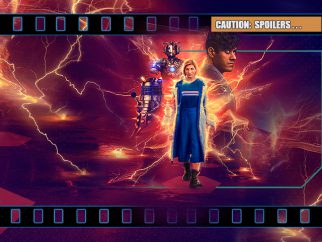
- Story7
- Acting7
- Direction8
- Production Design / VFX8

